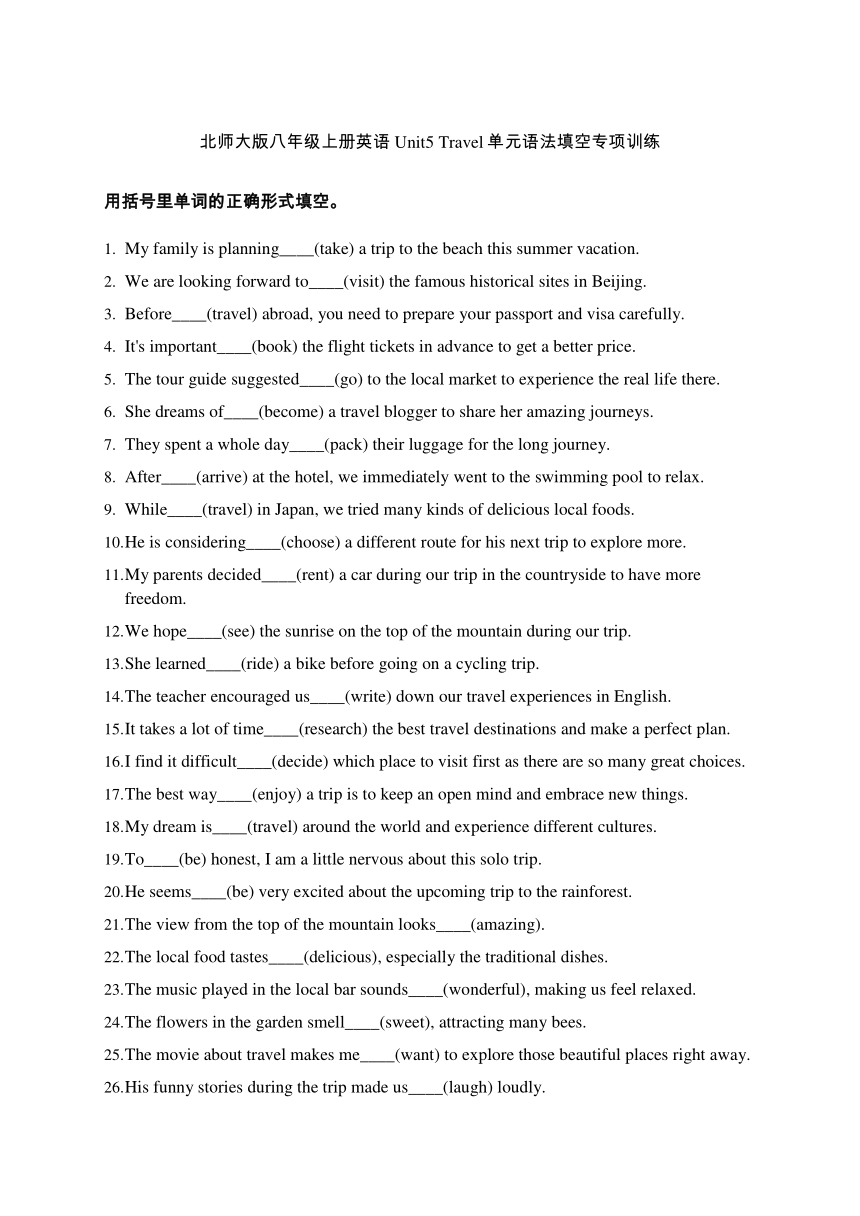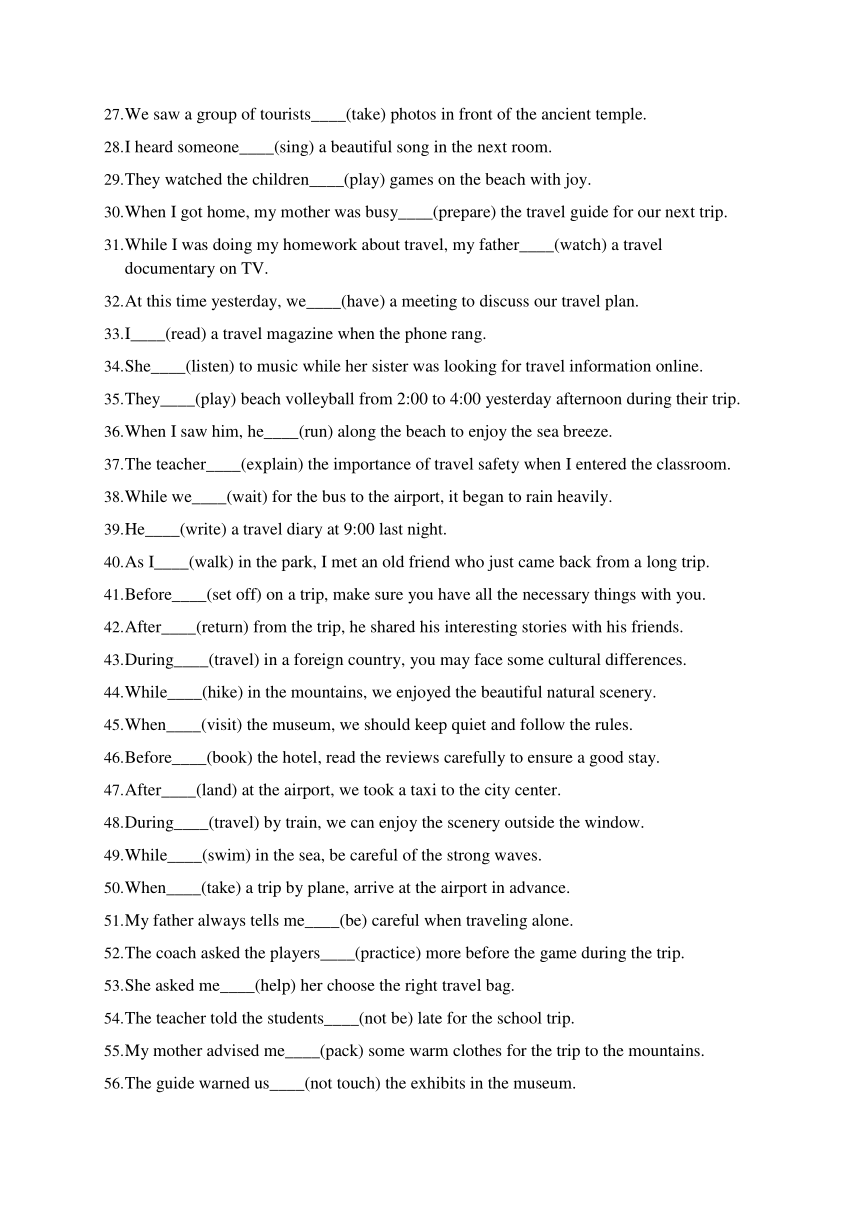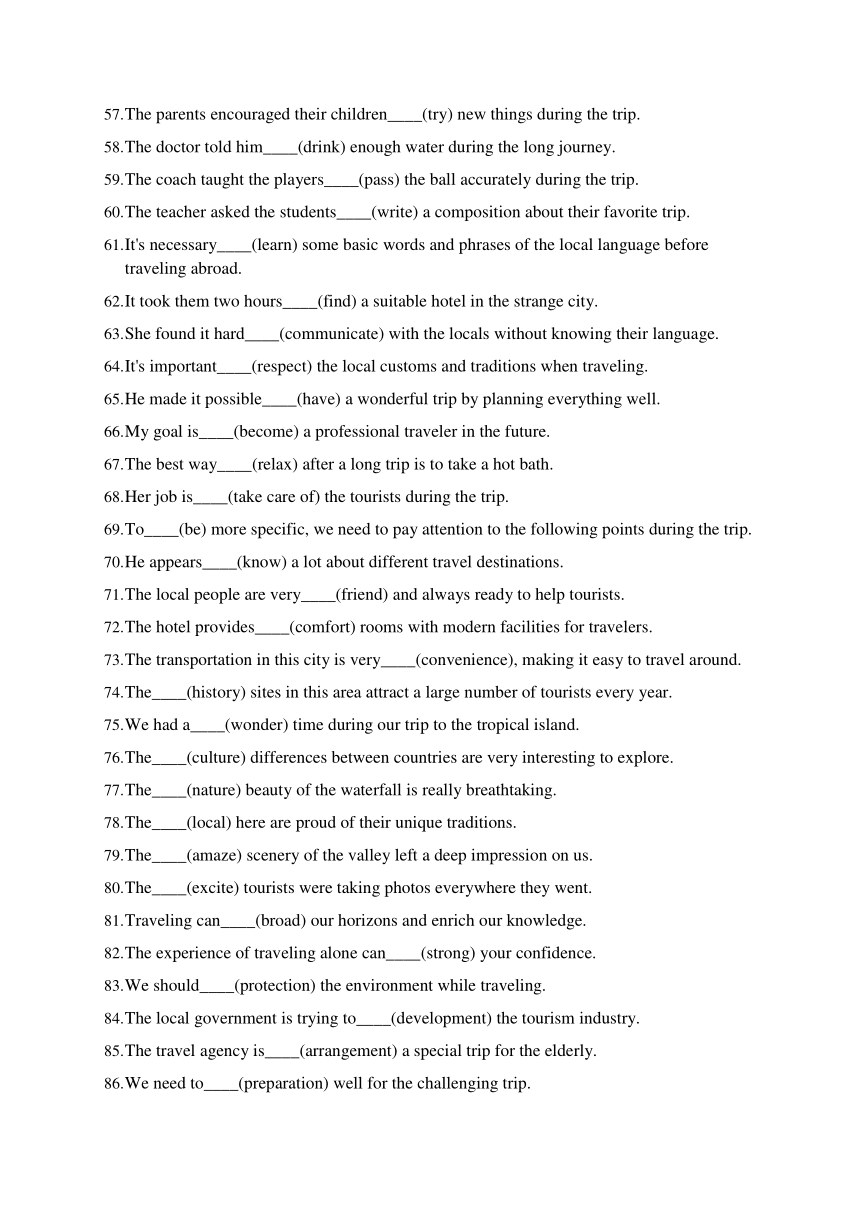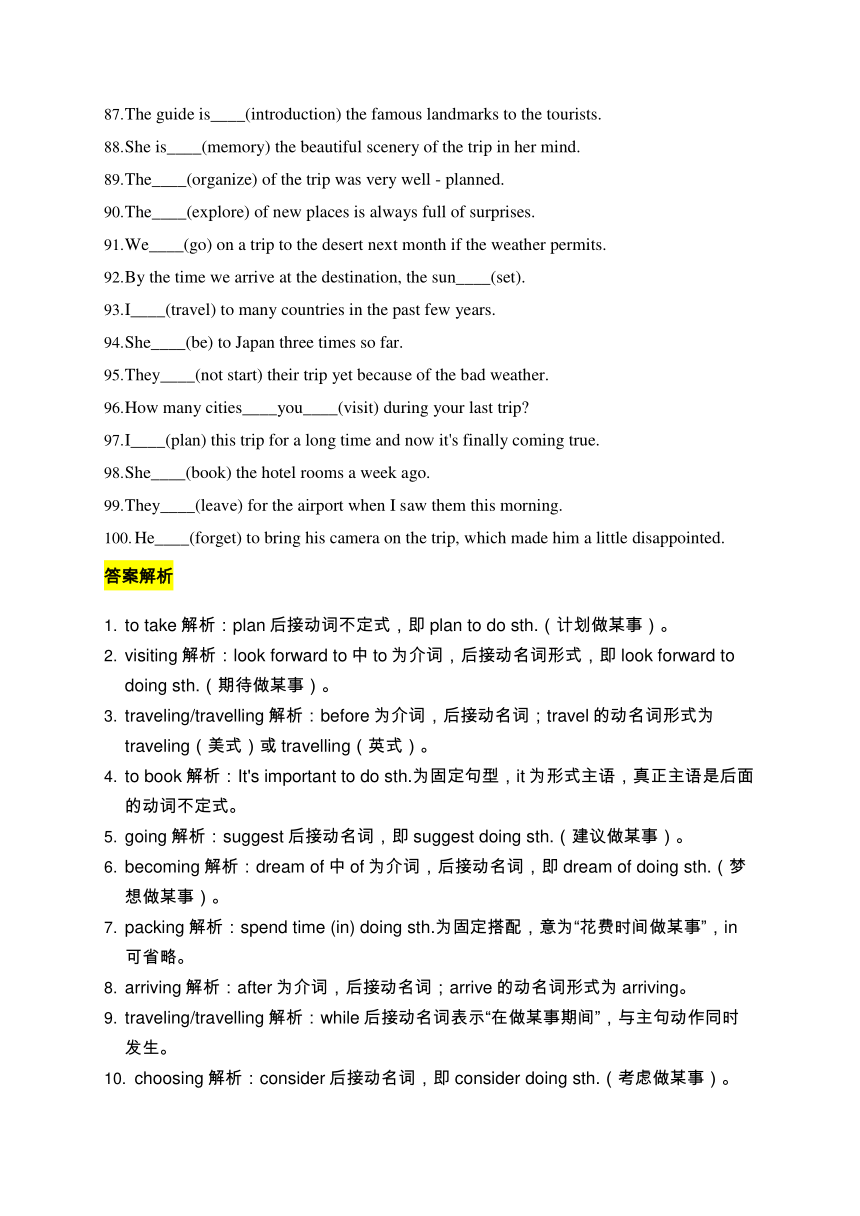北师大版(2024)八年级上册英语Unit5 Travel单元语法填空专项训练(含解析)
文档属性
| 名称 | 北师大版(2024)八年级上册英语Unit5 Travel单元语法填空专项训练(含解析) |  | |
| 格式 | docx | ||
| 文件大小 | 22.2KB | ||
| 资源类型 | 教案 | ||
| 版本资源 | 北师大版 | ||
| 科目 | 英语 | ||
| 更新时间 | 2025-08-18 22:35:24 | ||
图片预览




文档简介
北师大版八年级上册英语Unit5 Travel单元语法填空专项训练
用括号里单词的正确形式填空。
My family is planning____(take) a trip to the beach this summer vacation.
We are looking forward to____(visit) the famous historical sites in Beijing.
Before____(travel) abroad, you need to prepare your passport and visa carefully.
It's important____(book) the flight tickets in advance to get a better price.
The tour guide suggested____(go) to the local market to experience the real life there.
She dreams of____(become) a travel blogger to share her amazing journeys.
They spent a whole day____(pack) their luggage for the long journey.
After____(arrive) at the hotel, we immediately went to the swimming pool to relax.
While____(travel) in Japan, we tried many kinds of delicious local foods.
He is considering____(choose) a different route for his next trip to explore more.
My parents decided____(rent) a car during our trip in the countryside to have more freedom.
We hope____(see) the sunrise on the top of the mountain during our trip.
She learned____(ride) a bike before going on a cycling trip.
The teacher encouraged us____(write) down our travel experiences in English.
It takes a lot of time____(research) the best travel destinations and make a perfect plan.
I find it difficult____(decide) which place to visit first as there are so many great choices.
The best way____(enjoy) a trip is to keep an open mind and embrace new things.
My dream is____(travel) around the world and experience different cultures.
To____(be) honest, I am a little nervous about this solo trip.
He seems____(be) very excited about the upcoming trip to the rainforest.
The view from the top of the mountain looks____(amazing).
The local food tastes____(delicious), especially the traditional dishes.
The music played in the local bar sounds____(wonderful), making us feel relaxed.
The flowers in the garden smell____(sweet), attracting many bees.
The movie about travel makes me____(want) to explore those beautiful places right away.
His funny stories during the trip made us____(laugh) loudly.
We saw a group of tourists____(take) photos in front of the ancient temple.
I heard someone____(sing) a beautiful song in the next room.
They watched the children____(play) games on the beach with joy.
When I got home, my mother was busy____(prepare) the travel guide for our next trip.
While I was doing my homework about travel, my father____(watch) a travel documentary on TV.
At this time yesterday, we____(have) a meeting to discuss our travel plan.
I____(read) a travel magazine when the phone rang.
She____(listen) to music while her sister was looking for travel information online.
They____(play) beach volleyball from 2:00 to 4:00 yesterday afternoon during their trip.
When I saw him, he____(run) along the beach to enjoy the sea breeze.
The teacher____(explain) the importance of travel safety when I entered the classroom.
While we____(wait) for the bus to the airport, it began to rain heavily.
He____(write) a travel diary at 9:00 last night.
As I____(walk) in the park, I met an old friend who just came back from a long trip.
Before____(set off) on a trip, make sure you have all the necessary things with you.
After____(return) from the trip, he shared his interesting stories with his friends.
During____(travel) in a foreign country, you may face some cultural differences.
While____(hike) in the mountains, we enjoyed the beautiful natural scenery.
When____(visit) the museum, we should keep quiet and follow the rules.
Before____(book) the hotel, read the reviews carefully to ensure a good stay.
After____(land) at the airport, we took a taxi to the city center.
During____(travel) by train, we can enjoy the scenery outside the window.
While____(swim) in the sea, be careful of the strong waves.
When____(take) a trip by plane, arrive at the airport in advance.
My father always tells me____(be) careful when traveling alone.
The coach asked the players____(practice) more before the game during the trip.
She asked me____(help) her choose the right travel bag.
The teacher told the students____(not be) late for the school trip.
My mother advised me____(pack) some warm clothes for the trip to the mountains.
The guide warned us____(not touch) the exhibits in the museum.
The parents encouraged their children____(try) new things during the trip.
The doctor told him____(drink) enough water during the long journey.
The coach taught the players____(pass) the ball accurately during the trip.
The teacher asked the students____(write) a composition about their favorite trip.
It's necessary____(learn) some basic words and phrases of the local language before traveling abroad.
It took them two hours____(find) a suitable hotel in the strange city.
She found it hard____(communicate) with the locals without knowing their language.
It's important____(respect) the local customs and traditions when traveling.
He made it possible____(have) a wonderful trip by planning everything well.
My goal is____(become) a professional traveler in the future.
The best way____(relax) after a long trip is to take a hot bath.
Her job is____(take care of) the tourists during the trip.
To____(be) more specific, we need to pay attention to the following points during the trip.
He appears____(know) a lot about different travel destinations.
The local people are very____(friend) and always ready to help tourists.
The hotel provides____(comfort) rooms with modern facilities for travelers.
The transportation in this city is very____(convenience), making it easy to travel around.
The____(history) sites in this area attract a large number of tourists every year.
We had a____(wonder) time during our trip to the tropical island.
The____(culture) differences between countries are very interesting to explore.
The____(nature) beauty of the waterfall is really breathtaking.
The____(local) here are proud of their unique traditions.
The____(amaze) scenery of the valley left a deep impression on us.
The____(excite) tourists were taking photos everywhere they went.
Traveling can____(broad) our horizons and enrich our knowledge.
The experience of traveling alone can____(strong) your confidence.
We should____(protection) the environment while traveling.
The local government is trying to____(development) the tourism industry.
The travel agency is____(arrangement) a special trip for the elderly.
We need to____(preparation) well for the challenging trip.
The guide is____(introduction) the famous landmarks to the tourists.
She is____(memory) the beautiful scenery of the trip in her mind.
The____(organize) of the trip was very well - planned.
The____(explore) of new places is always full of surprises.
We____(go) on a trip to the desert next month if the weather permits.
By the time we arrive at the destination, the sun____(set).
I____(travel) to many countries in the past few years.
She____(be) to Japan three times so far.
They____(not start) their trip yet because of the bad weather.
How many cities____you____(visit) during your last trip
I____(plan) this trip for a long time and now it's finally coming true.
She____(book) the hotel rooms a week ago.
They____(leave) for the airport when I saw them this morning.
He____(forget) to bring his camera on the trip, which made him a little disappointed.
答案解析
to take解析:plan后接动词不定式,即plan to do sth.(计划做某事)。
visiting解析:look forward to中to为介词,后接动名词形式,即look forward to doing sth.(期待做某事)。
traveling/travelling解析:before为介词,后接动名词;travel的动名词形式为traveling(美式)或travelling(英式)。
to book解析:It's important to do sth.为固定句型,it为形式主语,真正主语是后面的动词不定式。
going解析:suggest后接动名词,即suggest doing sth.(建议做某事)。
becoming解析:dream of中of为介词,后接动名词,即dream of doing sth.(梦想做某事)。
packing解析:spend time (in) doing sth.为固定搭配,意为“花费时间做某事”,in可省略。
arriving解析:after为介词,后接动名词;arrive的动名词形式为arriving。
traveling/travelling解析:while后接动名词表示“在做某事期间”,与主句动作同时发生。
choosing解析:consider后接动名词,即consider doing sth.(考虑做某事)。
to rent解析:decide后接动词不定式,即decide to do sth.(决定做某事)。
to see解析:hope后接动词不定式,即hope to do sth.(希望做某事)。
to ride解析:learn后接动词不定式,即learn to do sth.(学习做某事)。
to write解析:encourage后接动词不定式,即encourage sb. to do sth.(鼓励某人做某事)。
to research解析:It takes time to do sth.为固定句型,it为形式主语,真正主语是动词不定式。
to decide解析:find it + adj. + to do sth.为固定结构,it为形式宾语,真正宾语是动词不定式。
to enjoy解析:the way to do sth.为固定搭配,意为“做某事的方法”。
to travel解析:be动词后接动词不定式作表语,说明主语的具体内容(梦想是“去旅行”)。
be解析:to be honest为固定短语,意为“说实话”,to后接动词原形。
to be解析:seem后接动词不定式,即seem to do sth.(似乎/好像做某事)。
amazing解析:look为系动词,后接形容词作表语;amazing形容事物“令人惊叹的”。
delicious解析:taste为系动词,后接形容词作表语;delicious意为“美味的”。
wonderful解析:sound为系动词,后接形容词作表语;wonderful意为“极好的”。
sweet解析:smell为系动词,后接形容词作表语;sweet意为“香甜的”。
want解析:make sb. do sth.为固定搭配,意为“使某人做某事”,接动词原形。
laugh解析:make sb. do sth.接动词原形,laugh意为“笑”。
taking解析:see sb. doing sth.意为“看见某人正在做某事”,强调动作正在进行。
singing解析:hear sb. doing sth.意为“听见某人正在做某事”,singing表示动作正在进行。
playing解析:watch sb. doing sth.意为“观看某人正在做某事”,playing体现动作的持续性。
preparing解析:be busy doing sth.为固定搭配,意为“忙于做某事”。
was watching解析:while引导的时间状语从句用过去进行时,主句也用过去进行时,强调两个动作同时发生。
were having解析:at this time yesterday(昨天这个时候)是过去进行时的标志,结构为was/were + doing。
was reading解析:when引导的时间状语从句用一般过去时,主句用过去进行时,强调“当某事发生时,另一件事正在进行”。
was listening解析:while引导的从句用过去进行时,主句也用过去进行时,表同时进行的动作。
were playing解析:from 2:00 to 4:00 yesterday afternoon(昨天下午2点到4点)是过去进行时的标志,表过去某段时间内持续的动作。
was running解析:when引导的从句用一般过去时,主句用过去进行时,表“当某事发生时,另一件事正在进行”。
was explaining解析:when引导的从句用一般过去时,主句用过去进行时,强调“我进入教室时,老师正在做某事”。
were waiting解析:while引导的从句用过去进行时,表“当我们正在等公交车时,天开始下雨”。
was writing解析:at 9:00 last night(昨晚9点)是过去进行时的标志,表过去某一时刻正在进行的动作。
was walking解析:as引导的时间状语从句用过去进行时,表“当我正在公园散步时,遇见了朋友”。
setting off解析:before为介词,后接动名词;set off的动名词形式为setting off。
returning解析:after为介词,后接动名词;return的动名词形式为returning。
traveling/travelling解析:during为介词,后接动名词;travel的动名词形式为traveling/travelling。
hiking解析:while后接动名词表“在徒步期间”,与主句动作同时发生。
visiting解析:when后接动名词表“在参观博物馆时”,强调时间状语。
booking解析:before为介词,后接动名词;book的动名词形式为booking。
landing解析:after为介词,后接动名词;land的动名词形式为landing。
traveling/travelling解析:during为介词,后接动名词;travel的动名词形式为traveling/travelling。
swimming解析:while后接动名词表“在游泳时”,与主句动作同时发生。
taking解析:when后接动名词表“在乘飞机旅行时”,强调时间状语。
to be解析:tell sb. to do sth.为固定搭配,意为“告诉某人做某事”,be careful意为“小心”。
to practice解析:ask sb. to do sth.意为“要求某人做某事”,practice意为“练习”。
to help解析:ask sb. to do sth.意为“请求某人做某事”,help意为“帮助”。
not to be解析:tell sb. not to do sth.为固定搭配,意为“告诉某人不要做某事”。
to pack解析:advise sb. to do sth.意为“建议某人做某事”,pack意为“打包”。
not to touch解析:warn sb. not to do sth.意为“警告某人不要做某事”,touch意为“触摸”。
to try解析:encourage sb. to do sth.意为“鼓励某人做某事”,try意为“尝试”。
to drink解析:tell sb. to do sth.意为“告诉某人做某事”,drink意为“喝”。
to pass解析:teach sb. to do sth.意为“教某人做某事”,pass意为“传递”。
to write解析:ask sb. to do sth.意为“要求某人做某事”,write意为“写”。
to learn解析:It's necessary to do sth.为固定句型,意为“做某事是必要的”。
to find解析:It takes sb. time to do sth.意为“做某事花费某人多长时间”,it为形式主语。
to communicate解析:find it + adj. + to do sth.中,it为形式宾语,真正宾语是动词不定式communicate。
to respect解析:It's important to do sth.意为“做某事是重要的”,respect意为“尊重”。
to have解析:make it possible to do sth.意为“使做某事成为可能”,it为形式宾语。
to become解析:be动词后接动词不定式作表语,说明主语“goal”的具体内容。
to relax解析:the way to do sth.意为“做某事的方法”,relax意为“放松”。
to take care of解析:be动词后接动词不定式作表语,说明主语“job”的具体内容。
be解析:to be more specific为固定短语,意为“更具体地说”,to后接动词原形。
to know解析:appear后接动词不定式,即appear to do sth.(似乎知道)。
friendly解析:be动词后接形容词作表语;friend的形容词形式为friendly(友好的)。
comfortable解析:名词rooms前需用形容词修饰;comfort的形容词形式为comfortable(舒适的)。
convenient解析:be动词后接形容词作表语;convenience的形容词形式为convenient(方便的)。
historical解析:名词sites前需用形容词修饰;history的形容词形式为historical(历史的)。
wonderful解析:名词time前需用形容词修饰;wonder的形容词形式为wonderful(极好的)。
cultural解析:名词differences前需用形容词修饰;culture的形容词形式为cultural(文化的)。
natural解析:名词beauty前需用形容词修饰;nature的形容词形式为natural(自然的)。
locals解析:定冠词the后接名词;local的名词复数形式为locals(当地人)。
amazing解析:名词scenery前需用形容词修饰;amaze的形容词形式为amazing(令人惊叹的)。
excited解析:名词tourists前需用形容词修饰;excite的形容词形式为excited(感到兴奋的,修饰人)。
broaden解析:情态动词can后接动词原形;broad的动词形式为broaden(拓宽)。
strengthen解析:情态动词can后接动词原形;strong的动词形式为strengthen(增强)。
protect解析:情态动词should后接动词原形;protection的动词形式为protect(保护)。
develop解析:try to后接动词原形;development的动词形式为develop(发展)。
arranging解析:be动词后接现在分词构成现在进行时;arrangement的动词形式为arrange,现在分词为arranging。
prepare解析:need to后接动词原形;preparation的动词形式为prepare(准备)。
introducing解析:be动词后接现在分词构成现在进行时;introduction的动词形式为introduce,现在分词为introducing。
memorizing解析:be动词后接现在分词构成现在进行时;memory的动词形式为memorize,现在分词为memorizing。
organization解析:定冠词the后接名词;organize的名词形式为organization(组织,安排)。
exploration解析:定冠词the后接名词;explore的名词形式为exploration(探索)。
will go解析:next month(下个月)是一般将来时的标志,结构为will + 动词原形。
will have set解析:by the time引导的时间状语从句用一般现在时(表将来),主句用将来完成时,结构为will have + 过去分词。
have traveled/travelled解析:in the past few years(过去几年)是现在完成时的标志,结构为have/has + 过去分词;主语为I,用have。
has been解析:so far(到目前为止)是现在完成时的标志;have/has been to意为“去过某地”,主语为she,用has。
haven't started解析:yet(还,尚未)是现在完成时的标志,否定形式为haven't/hasn't + 过去分词;主语为they,用haven't。
have; visited解析:during your last trip(在上次旅行期间)结合语境强调“到现在为止的结果”,用现在完成时,结构为have/has + 过去分词;主语为you,用have。
have planned解析:for a long time(很长时间)是现在完成时的标志,强调动作从过去持续到现在;主语为I,用have。
booked解析:a week ago(一周前)是一般过去时的标志,谓语动词用过去式;book的过去式为booked。
were leaving解析:when引导的从句用一般过去时,主句用过去进行时表“过去即将发生的动作”,结构为was/were + 现在分词;主语为they,用were。
forgot解析:语境描述过去发生的动作(旅行时忘记带相机),用一般过去时;forget的过去式为forgot。
用括号里单词的正确形式填空。
My family is planning____(take) a trip to the beach this summer vacation.
We are looking forward to____(visit) the famous historical sites in Beijing.
Before____(travel) abroad, you need to prepare your passport and visa carefully.
It's important____(book) the flight tickets in advance to get a better price.
The tour guide suggested____(go) to the local market to experience the real life there.
She dreams of____(become) a travel blogger to share her amazing journeys.
They spent a whole day____(pack) their luggage for the long journey.
After____(arrive) at the hotel, we immediately went to the swimming pool to relax.
While____(travel) in Japan, we tried many kinds of delicious local foods.
He is considering____(choose) a different route for his next trip to explore more.
My parents decided____(rent) a car during our trip in the countryside to have more freedom.
We hope____(see) the sunrise on the top of the mountain during our trip.
She learned____(ride) a bike before going on a cycling trip.
The teacher encouraged us____(write) down our travel experiences in English.
It takes a lot of time____(research) the best travel destinations and make a perfect plan.
I find it difficult____(decide) which place to visit first as there are so many great choices.
The best way____(enjoy) a trip is to keep an open mind and embrace new things.
My dream is____(travel) around the world and experience different cultures.
To____(be) honest, I am a little nervous about this solo trip.
He seems____(be) very excited about the upcoming trip to the rainforest.
The view from the top of the mountain looks____(amazing).
The local food tastes____(delicious), especially the traditional dishes.
The music played in the local bar sounds____(wonderful), making us feel relaxed.
The flowers in the garden smell____(sweet), attracting many bees.
The movie about travel makes me____(want) to explore those beautiful places right away.
His funny stories during the trip made us____(laugh) loudly.
We saw a group of tourists____(take) photos in front of the ancient temple.
I heard someone____(sing) a beautiful song in the next room.
They watched the children____(play) games on the beach with joy.
When I got home, my mother was busy____(prepare) the travel guide for our next trip.
While I was doing my homework about travel, my father____(watch) a travel documentary on TV.
At this time yesterday, we____(have) a meeting to discuss our travel plan.
I____(read) a travel magazine when the phone rang.
She____(listen) to music while her sister was looking for travel information online.
They____(play) beach volleyball from 2:00 to 4:00 yesterday afternoon during their trip.
When I saw him, he____(run) along the beach to enjoy the sea breeze.
The teacher____(explain) the importance of travel safety when I entered the classroom.
While we____(wait) for the bus to the airport, it began to rain heavily.
He____(write) a travel diary at 9:00 last night.
As I____(walk) in the park, I met an old friend who just came back from a long trip.
Before____(set off) on a trip, make sure you have all the necessary things with you.
After____(return) from the trip, he shared his interesting stories with his friends.
During____(travel) in a foreign country, you may face some cultural differences.
While____(hike) in the mountains, we enjoyed the beautiful natural scenery.
When____(visit) the museum, we should keep quiet and follow the rules.
Before____(book) the hotel, read the reviews carefully to ensure a good stay.
After____(land) at the airport, we took a taxi to the city center.
During____(travel) by train, we can enjoy the scenery outside the window.
While____(swim) in the sea, be careful of the strong waves.
When____(take) a trip by plane, arrive at the airport in advance.
My father always tells me____(be) careful when traveling alone.
The coach asked the players____(practice) more before the game during the trip.
She asked me____(help) her choose the right travel bag.
The teacher told the students____(not be) late for the school trip.
My mother advised me____(pack) some warm clothes for the trip to the mountains.
The guide warned us____(not touch) the exhibits in the museum.
The parents encouraged their children____(try) new things during the trip.
The doctor told him____(drink) enough water during the long journey.
The coach taught the players____(pass) the ball accurately during the trip.
The teacher asked the students____(write) a composition about their favorite trip.
It's necessary____(learn) some basic words and phrases of the local language before traveling abroad.
It took them two hours____(find) a suitable hotel in the strange city.
She found it hard____(communicate) with the locals without knowing their language.
It's important____(respect) the local customs and traditions when traveling.
He made it possible____(have) a wonderful trip by planning everything well.
My goal is____(become) a professional traveler in the future.
The best way____(relax) after a long trip is to take a hot bath.
Her job is____(take care of) the tourists during the trip.
To____(be) more specific, we need to pay attention to the following points during the trip.
He appears____(know) a lot about different travel destinations.
The local people are very____(friend) and always ready to help tourists.
The hotel provides____(comfort) rooms with modern facilities for travelers.
The transportation in this city is very____(convenience), making it easy to travel around.
The____(history) sites in this area attract a large number of tourists every year.
We had a____(wonder) time during our trip to the tropical island.
The____(culture) differences between countries are very interesting to explore.
The____(nature) beauty of the waterfall is really breathtaking.
The____(local) here are proud of their unique traditions.
The____(amaze) scenery of the valley left a deep impression on us.
The____(excite) tourists were taking photos everywhere they went.
Traveling can____(broad) our horizons and enrich our knowledge.
The experience of traveling alone can____(strong) your confidence.
We should____(protection) the environment while traveling.
The local government is trying to____(development) the tourism industry.
The travel agency is____(arrangement) a special trip for the elderly.
We need to____(preparation) well for the challenging trip.
The guide is____(introduction) the famous landmarks to the tourists.
She is____(memory) the beautiful scenery of the trip in her mind.
The____(organize) of the trip was very well - planned.
The____(explore) of new places is always full of surprises.
We____(go) on a trip to the desert next month if the weather permits.
By the time we arrive at the destination, the sun____(set).
I____(travel) to many countries in the past few years.
She____(be) to Japan three times so far.
They____(not start) their trip yet because of the bad weather.
How many cities____you____(visit) during your last trip
I____(plan) this trip for a long time and now it's finally coming true.
She____(book) the hotel rooms a week ago.
They____(leave) for the airport when I saw them this morning.
He____(forget) to bring his camera on the trip, which made him a little disappointed.
答案解析
to take解析:plan后接动词不定式,即plan to do sth.(计划做某事)。
visiting解析:look forward to中to为介词,后接动名词形式,即look forward to doing sth.(期待做某事)。
traveling/travelling解析:before为介词,后接动名词;travel的动名词形式为traveling(美式)或travelling(英式)。
to book解析:It's important to do sth.为固定句型,it为形式主语,真正主语是后面的动词不定式。
going解析:suggest后接动名词,即suggest doing sth.(建议做某事)。
becoming解析:dream of中of为介词,后接动名词,即dream of doing sth.(梦想做某事)。
packing解析:spend time (in) doing sth.为固定搭配,意为“花费时间做某事”,in可省略。
arriving解析:after为介词,后接动名词;arrive的动名词形式为arriving。
traveling/travelling解析:while后接动名词表示“在做某事期间”,与主句动作同时发生。
choosing解析:consider后接动名词,即consider doing sth.(考虑做某事)。
to rent解析:decide后接动词不定式,即decide to do sth.(决定做某事)。
to see解析:hope后接动词不定式,即hope to do sth.(希望做某事)。
to ride解析:learn后接动词不定式,即learn to do sth.(学习做某事)。
to write解析:encourage后接动词不定式,即encourage sb. to do sth.(鼓励某人做某事)。
to research解析:It takes time to do sth.为固定句型,it为形式主语,真正主语是动词不定式。
to decide解析:find it + adj. + to do sth.为固定结构,it为形式宾语,真正宾语是动词不定式。
to enjoy解析:the way to do sth.为固定搭配,意为“做某事的方法”。
to travel解析:be动词后接动词不定式作表语,说明主语的具体内容(梦想是“去旅行”)。
be解析:to be honest为固定短语,意为“说实话”,to后接动词原形。
to be解析:seem后接动词不定式,即seem to do sth.(似乎/好像做某事)。
amazing解析:look为系动词,后接形容词作表语;amazing形容事物“令人惊叹的”。
delicious解析:taste为系动词,后接形容词作表语;delicious意为“美味的”。
wonderful解析:sound为系动词,后接形容词作表语;wonderful意为“极好的”。
sweet解析:smell为系动词,后接形容词作表语;sweet意为“香甜的”。
want解析:make sb. do sth.为固定搭配,意为“使某人做某事”,接动词原形。
laugh解析:make sb. do sth.接动词原形,laugh意为“笑”。
taking解析:see sb. doing sth.意为“看见某人正在做某事”,强调动作正在进行。
singing解析:hear sb. doing sth.意为“听见某人正在做某事”,singing表示动作正在进行。
playing解析:watch sb. doing sth.意为“观看某人正在做某事”,playing体现动作的持续性。
preparing解析:be busy doing sth.为固定搭配,意为“忙于做某事”。
was watching解析:while引导的时间状语从句用过去进行时,主句也用过去进行时,强调两个动作同时发生。
were having解析:at this time yesterday(昨天这个时候)是过去进行时的标志,结构为was/were + doing。
was reading解析:when引导的时间状语从句用一般过去时,主句用过去进行时,强调“当某事发生时,另一件事正在进行”。
was listening解析:while引导的从句用过去进行时,主句也用过去进行时,表同时进行的动作。
were playing解析:from 2:00 to 4:00 yesterday afternoon(昨天下午2点到4点)是过去进行时的标志,表过去某段时间内持续的动作。
was running解析:when引导的从句用一般过去时,主句用过去进行时,表“当某事发生时,另一件事正在进行”。
was explaining解析:when引导的从句用一般过去时,主句用过去进行时,强调“我进入教室时,老师正在做某事”。
were waiting解析:while引导的从句用过去进行时,表“当我们正在等公交车时,天开始下雨”。
was writing解析:at 9:00 last night(昨晚9点)是过去进行时的标志,表过去某一时刻正在进行的动作。
was walking解析:as引导的时间状语从句用过去进行时,表“当我正在公园散步时,遇见了朋友”。
setting off解析:before为介词,后接动名词;set off的动名词形式为setting off。
returning解析:after为介词,后接动名词;return的动名词形式为returning。
traveling/travelling解析:during为介词,后接动名词;travel的动名词形式为traveling/travelling。
hiking解析:while后接动名词表“在徒步期间”,与主句动作同时发生。
visiting解析:when后接动名词表“在参观博物馆时”,强调时间状语。
booking解析:before为介词,后接动名词;book的动名词形式为booking。
landing解析:after为介词,后接动名词;land的动名词形式为landing。
traveling/travelling解析:during为介词,后接动名词;travel的动名词形式为traveling/travelling。
swimming解析:while后接动名词表“在游泳时”,与主句动作同时发生。
taking解析:when后接动名词表“在乘飞机旅行时”,强调时间状语。
to be解析:tell sb. to do sth.为固定搭配,意为“告诉某人做某事”,be careful意为“小心”。
to practice解析:ask sb. to do sth.意为“要求某人做某事”,practice意为“练习”。
to help解析:ask sb. to do sth.意为“请求某人做某事”,help意为“帮助”。
not to be解析:tell sb. not to do sth.为固定搭配,意为“告诉某人不要做某事”。
to pack解析:advise sb. to do sth.意为“建议某人做某事”,pack意为“打包”。
not to touch解析:warn sb. not to do sth.意为“警告某人不要做某事”,touch意为“触摸”。
to try解析:encourage sb. to do sth.意为“鼓励某人做某事”,try意为“尝试”。
to drink解析:tell sb. to do sth.意为“告诉某人做某事”,drink意为“喝”。
to pass解析:teach sb. to do sth.意为“教某人做某事”,pass意为“传递”。
to write解析:ask sb. to do sth.意为“要求某人做某事”,write意为“写”。
to learn解析:It's necessary to do sth.为固定句型,意为“做某事是必要的”。
to find解析:It takes sb. time to do sth.意为“做某事花费某人多长时间”,it为形式主语。
to communicate解析:find it + adj. + to do sth.中,it为形式宾语,真正宾语是动词不定式communicate。
to respect解析:It's important to do sth.意为“做某事是重要的”,respect意为“尊重”。
to have解析:make it possible to do sth.意为“使做某事成为可能”,it为形式宾语。
to become解析:be动词后接动词不定式作表语,说明主语“goal”的具体内容。
to relax解析:the way to do sth.意为“做某事的方法”,relax意为“放松”。
to take care of解析:be动词后接动词不定式作表语,说明主语“job”的具体内容。
be解析:to be more specific为固定短语,意为“更具体地说”,to后接动词原形。
to know解析:appear后接动词不定式,即appear to do sth.(似乎知道)。
friendly解析:be动词后接形容词作表语;friend的形容词形式为friendly(友好的)。
comfortable解析:名词rooms前需用形容词修饰;comfort的形容词形式为comfortable(舒适的)。
convenient解析:be动词后接形容词作表语;convenience的形容词形式为convenient(方便的)。
historical解析:名词sites前需用形容词修饰;history的形容词形式为historical(历史的)。
wonderful解析:名词time前需用形容词修饰;wonder的形容词形式为wonderful(极好的)。
cultural解析:名词differences前需用形容词修饰;culture的形容词形式为cultural(文化的)。
natural解析:名词beauty前需用形容词修饰;nature的形容词形式为natural(自然的)。
locals解析:定冠词the后接名词;local的名词复数形式为locals(当地人)。
amazing解析:名词scenery前需用形容词修饰;amaze的形容词形式为amazing(令人惊叹的)。
excited解析:名词tourists前需用形容词修饰;excite的形容词形式为excited(感到兴奋的,修饰人)。
broaden解析:情态动词can后接动词原形;broad的动词形式为broaden(拓宽)。
strengthen解析:情态动词can后接动词原形;strong的动词形式为strengthen(增强)。
protect解析:情态动词should后接动词原形;protection的动词形式为protect(保护)。
develop解析:try to后接动词原形;development的动词形式为develop(发展)。
arranging解析:be动词后接现在分词构成现在进行时;arrangement的动词形式为arrange,现在分词为arranging。
prepare解析:need to后接动词原形;preparation的动词形式为prepare(准备)。
introducing解析:be动词后接现在分词构成现在进行时;introduction的动词形式为introduce,现在分词为introducing。
memorizing解析:be动词后接现在分词构成现在进行时;memory的动词形式为memorize,现在分词为memorizing。
organization解析:定冠词the后接名词;organize的名词形式为organization(组织,安排)。
exploration解析:定冠词the后接名词;explore的名词形式为exploration(探索)。
will go解析:next month(下个月)是一般将来时的标志,结构为will + 动词原形。
will have set解析:by the time引导的时间状语从句用一般现在时(表将来),主句用将来完成时,结构为will have + 过去分词。
have traveled/travelled解析:in the past few years(过去几年)是现在完成时的标志,结构为have/has + 过去分词;主语为I,用have。
has been解析:so far(到目前为止)是现在完成时的标志;have/has been to意为“去过某地”,主语为she,用has。
haven't started解析:yet(还,尚未)是现在完成时的标志,否定形式为haven't/hasn't + 过去分词;主语为they,用haven't。
have; visited解析:during your last trip(在上次旅行期间)结合语境强调“到现在为止的结果”,用现在完成时,结构为have/has + 过去分词;主语为you,用have。
have planned解析:for a long time(很长时间)是现在完成时的标志,强调动作从过去持续到现在;主语为I,用have。
booked解析:a week ago(一周前)是一般过去时的标志,谓语动词用过去式;book的过去式为booked。
were leaving解析:when引导的从句用一般过去时,主句用过去进行时表“过去即将发生的动作”,结构为was/were + 现在分词;主语为they,用were。
forgot解析:语境描述过去发生的动作(旅行时忘记带相机),用一般过去时;forget的过去式为forgot。
同课章节目录
